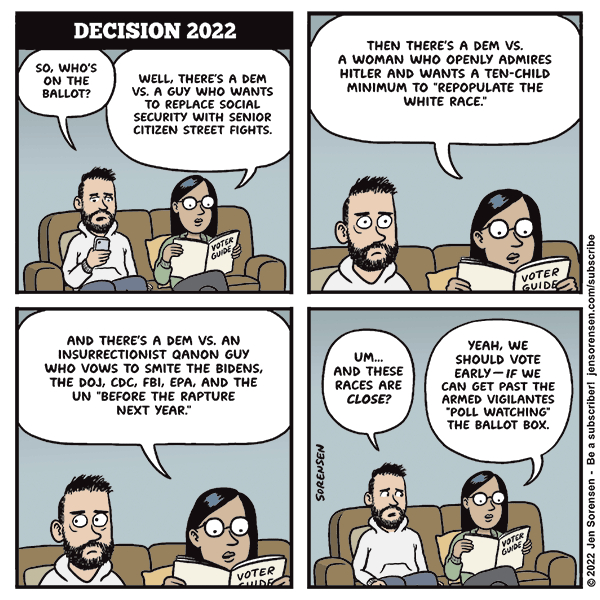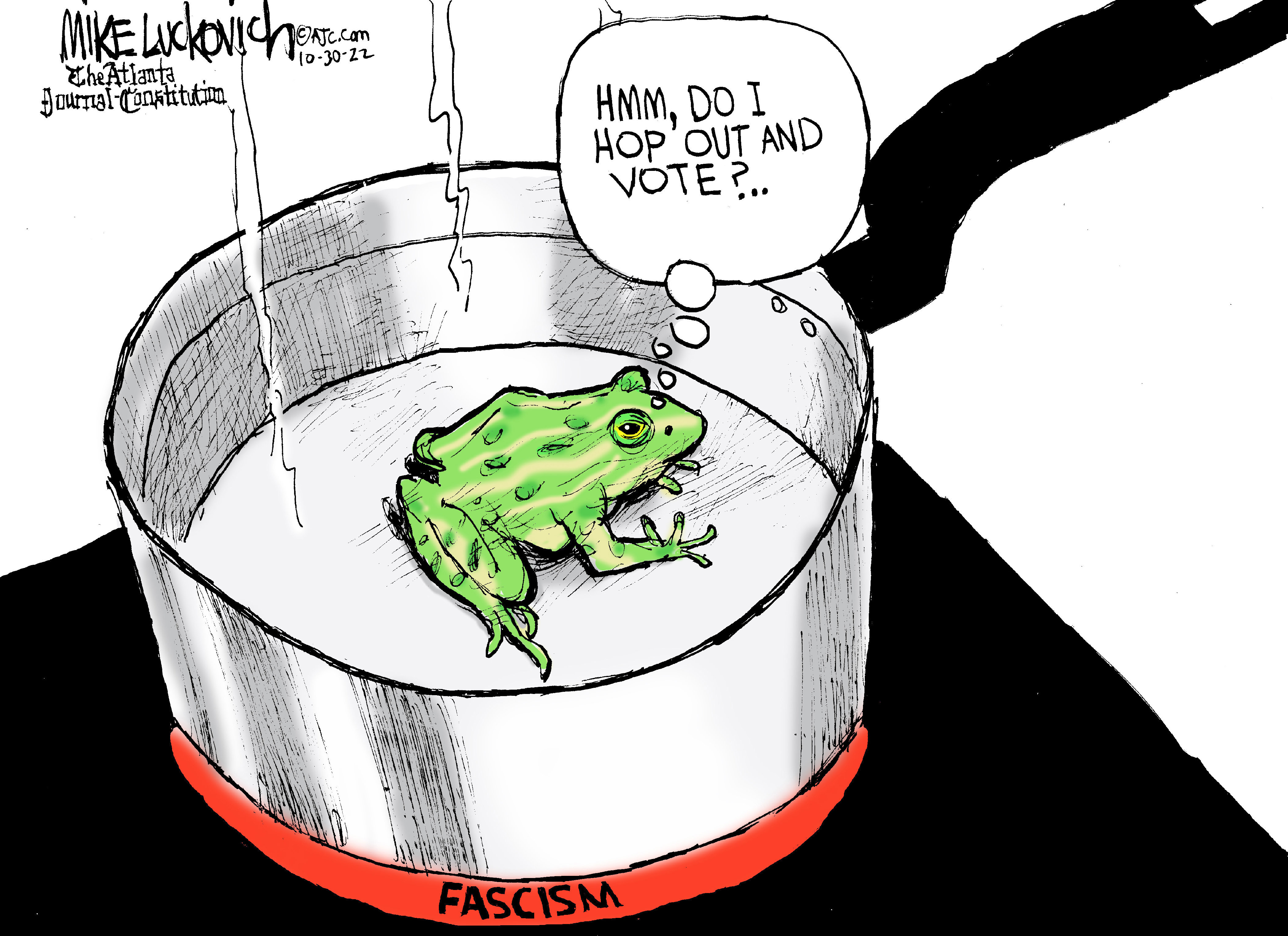No one pretends that democracy is perfect or all-wise. Indeed, it has been said that democracy is the worst form of government — except all those other forms that have been tried from time to time.
- Winston Churchill
This week's featured post is "Can conservatives be allies against climate change?"
And if you're wondering what I did with my week off, here's the talk I gave.
This week everybody has been talking about tomorrow's elections

Ordinarily, the day before an election I write a guide for people who plan to watch the returns come in, including things like poll closing times in various states, which early-reporting races are likely to be bellwethers for how the night is going, and so on.
I'm not doing that this time, because I'm not planning to watch, so I'm not sure that I want to encourage you to watch. Probably I won't be able to resist briefly turning the TV on every hour or two, but I don't think that an all-evening watch party will be good for my health and sanity.
It's not that I'm sure my candidates will lose, although the polls have been trending that way for the last few weeks. It's possible that the attack on Paul Pelosi (see next note) was a wake-up call to the electorate, that Obama's tour of swing states will make a difference, or that the polls have been undercounting young women who previously haven't voted, but will turn out to protect their reproductive rights. So there's reason to hope, reason to vote, and reason to do whatever you can to encourage others to vote.
The reason I'm planning to restrain myself from watching the returns is that I have a bad attitude: I'm pissed at the American people. A lot of these races shouldn't be close. Herschel Walker, for one, should not have gotten anywhere near the Senate, and the idea that he can run (against a minister like Rafael Warnock) as the "Christian" candidate should scandalize anyone who cares about Jesus or the churches founded in his name. And Ron Johnson didn't just wink and nod as Trump tried to overthrow American democracy, he was an active participant in the plot to count the votes of fake electors. I could go on.
I didn't used to feel this way. When John McCain in 2008 and Mitt Romney in 2012 ran against Barack Obama, for example, I had no doubt that I wanted Obama to win. But I also saw some virtues in McCain and Romney, and I understood how someone with different values could rate those virtues higher than Obama's virtues. (During the 2012 primaries, I wrote "The Tragedy of Mitt Romney" about the candidate he could have been.)
This year, I've lost that vision and that generosity of spirit. I can't twist a few knobs in my values and picture myself supporting Doug Mastriano or Kari Lake. How does that go? "Sure, he's antisemitic, but ..." or "I know she's against democracy, but ..."
With exceptions I can count on my fingers, the Republican Party is now a personality cult, and the man they worship is a fascist. I can't get past that.

So anyway, there are polls. Nate Silver is currently giving Republicans an 83% chance to take the House and a 55% chance to take the Senate.
The key Senate races are Georgia (where Herschel Walker has a 58% chance of defeating Raphael Warnock), Nevada (Paul Laxalt has a 57% chance to defeat Catherine Cortez Masto), and Pennsylvania (John Fetterman has a 54% chance to defeat Mehmet Oz). Whichever party takes two of those three races probably wins the Senate.
and the Pelosi attack
The narrative here is pretty simple: Republican rhetoric has been demonizing Nancy Pelosi for decades, and we've known for a while that some of the more unhinged right-wing partisans take that demonic image very seriously. QAnon folks, for example, promote the libel that she (and other top Democrats) drink the blood of children. Some of the seditionists on January 6 were roaming the halls of the Capitol calling "Nancy ... Nancy" like villains in a horror movie.
So early in the morning of Friday October 28, the Speaker's 82-year-old husband woke up to find a man standing over his bed with a hammer, asking where Nancy was. He said he was there to "have a little chat" with Speaker Pelosi, and later told police he intended to kidnap the Speaker and break her kneecaps unless she told him "the truth", whatever he imagined the truth to be.
Paul Pelosi then had a bizarre conversation with the attacker, during which he managed to call 911. When police arrived, the attacker hit Pelosi in the head with the hammer. We don't have a lot of details about his injuries, but he needed surgery and didn't get out of the hospital until Thursday.
It's important to be clear on what Republicans are and aren't responsible for here. The attacker looks to be a deranged loner, rather than part of an organized fascist group like the Oath Keepers or Proud Boys, or even the men recently convicted of plotting to kidnap Michigan Governor Gretchen Whitmer. No one is accusing Trump or any of the leaders of his cult with planning or carrying out the attack.
At worst, this seems to be "stochastic terrorism" -- promoting the idea that your political enemies deserve violence, while knowing that you have violent followers who are likely to respond. The classic example is King Henry II saying "Will no one rid me of this troublesome priest?", which resulted in the murder of Thomas Becket. Henry's hands may have stayed clean, but he knew or should have known what might happen.
Even that judgment may seem a bit harsh, until you look at how Republicans reacted to news of the attack. Their immediate reflex was to make up and promote a false narrative in which the attack had nothing to do with politics, but instead reflected badly on Paul Pelosi himself.
The flood of falsehoods showed how ingrained misinformation has become inside the G.O.P., where the reflexive response of the rank and file — and even a few prominent figures — to anything that might cast a negative light on the right is to deflect with more fictional claims, creating a vicious cycle that muddies facts, shifts blame and minimizes violence.
Donald Trump Jr. quickly tweeted a joke about the attack, and Trump Sr. told an interviewer that there were "weird things going on in that household the last couple of weeks", as if the Pelosis had done something to invite violence. Kari Lake got uproarious laughter by telling a campaign crowd "Nancy Pelosi, well, she's got protection when she's in D.C. Apparently, her house doesn't have a lot of protection." Lake did not appear shocked by the response, and did nothing to rein in the hilarity.
What should Republicans say? Well, here's what Bernie Sanders said in 2017 (which is how far back you have to go to find any comparable liberal political violence) after the shooter of Steve Scalise turned out to have been a volunteer for the Sanders presidential campaign:
I am sickened by this despicable act. Let me be as clear as I can be. Violence of any kind is unacceptable in our society and I condemn this action in the strongest possible terms. Real change can only come about through nonviolent action, and anything else runs against our most deeply held American values. My hopes and prayers are that Representative Scalise, congressional staff and the Capitol Police Officers who were wounded make a quick and full recovery. I also want to thank the Capitol Police for their heroic actions to prevent further harm.
No jokes, no conspiracy theories, no implications that Scalise was asking for it somehow. No excuses about how "passionate" Sanders' supporters are, or how "angry" the state of the country has made them. Just: This is wrong. Don't do it.
Given the upswing in right-wing violence since Trump lost the 2020 election, I'd like to hear an even stronger statement:
If any of my supporters think they're doing me a favor by physically attacking my political rivals, they're wrong. If you're involved in any ongoing plots, I want you to stop.
But Trump and the other MAGA Republicans won't say anything like that, because don't believe political violence is "unacceptable". Quite the opposite: They're counting on it.

and Twitter
So, after months of stop-and-start will-he-or-won't-he, Elon Musk finally owns Twitter. He immediately fired a lot of people and announced a lot of intentions that may not manifest for some while, if ever. There's some evidence that trolling and hate speech have already increased in anticipation of lower standards and more lax enforcement.
My personal experience of Twitter hasn't changed yet, so I'm in a wait-and-see mode. I'm hearing a lot of people talk about closing their account and moving to some rival platform, but there's not a simple Coke/Pepsi or iPhone/Android replacement.
What we need is a sagacious, media-savvy voice of sanity, and I'll nominate James Fallows. He makes a few key points in his Substack post "Twitter is Our Future".
- He plans to stay on Twitter for the time being.
- He's not going to pay a monthly fee to maintain his "blue check mark" (which verifies that he is who he says he is), because those check marks benefit the system as a whole, not him as an individual.
- Twitter is a "bellwether" for changing media platforms in general. Many online communities are going to be displaced as media sites change, but the process is happening much faster on Twitter.
- While individual tweets aren't reliable sources of information, they are valuable tips about what might be happening.
- Musk himself is "like a rich football fan buying an NFL team and imagining that he can name draft-picks and call plays." Fallows also quotes a line from The Great Gatsby: "They were careless people… they smashed up things and creatures and then retreated back into their money or their vast carelessness… and let other people clean up the mess they had made."
- No single site will replace Twitter, but "there will have to be many, and we’ll blunder and feel our way forward."
The substitute most Twitter-refugees are choosing is Mastodon, which is not exactly the same thing. I haven't tried it yet.
and nuclear threats
If the rest of the news wasn't depressing enough this week, The New Yorker's resident Putin expert, Masha Gessen, warns that we need to take his threat to use nuclear weapons seriously.
In the end, every “rational” case for why Putin won’t use nuclear weapons in Ukraine falls short. He is not afraid of losing support from his current allies, because he misapprehends Russia’s position in the world; he sees Russia as politically, economically, and militarily stronger than it is. Chinese and Indian leaders may express alarm at the use of extreme measures such as nuclear weapons, but to Putin this points to their lack of resolve—their weakness, not the Kremlin’s. And, if need be, he is prepared to make outlandish denials, no matter how implausible. ...
The arguments that Putin won’t use nuclear weapons because doing so would endanger Russians, including himself, are blind to the fact that Putin believes he has the right, possibly the moral obligation, to sacrifice hundreds of thousands or millions of people. The argument that a nuclear strike wouldn’t help Putin achieve his strategic goals mistakes Russia’s strategic goals as anything but inflicting terror on Ukrainians. The losses the Russian military is suffering now can only motivate Putin to create more terror, against more people.

you also might be interested in ...
The week's good news was that Jair Bolsonaro narrowly lost his re-election bid in Brazil, and it looks like he's going to accept that he has to leave office. Brazilian election officials made an interesting choice: They avoided the appearance of election shenanigans by going with electronic voting systems that produce instant results. In the long run, though, they've made real voting fraud easier, because the lack of paper ballots makes the system impossible to audit.

Benjamin Netanyahu is poised to reclaim the prime minister's office following the recent elections. It's tempting to shrug and say "We've been here before", but actually we haven't. This time his coalition includes some right-wing parties that used to be beyond the pale in Israeli politics.
Some members of his likely parliamentary majority believe in Jewish supremacy and support racist policies that may ultimately change the way the state of Israel protects the rights of its citizens, whether Palestinians who hold citizenship or leftists, activists, and critics who seek equal rights for Palestinians in the occupied territory.
NYT columnist Thomas Friedman says "The Israel we knew is gone."
Netanyahu has been propelled into power by bedfellows who: see Israeli Arab citizens as a fifth column who can’t be trusted; have vowed to take political control over judicial appointments; believe that Jewish settlements must be expanded so there is not an inch left anywhere in the West Bank for a Palestinian state; want to enact judicial changes that could freeze Netanyahu’s ongoing corruption trial; and express contempt for Israel’s long and strong embrace of L.G.B.T.Q. rights.

and let's close with something moving
When the world gets to be too much, you can always dance, even if the music isn't from your era.
No comments:
Post a Comment